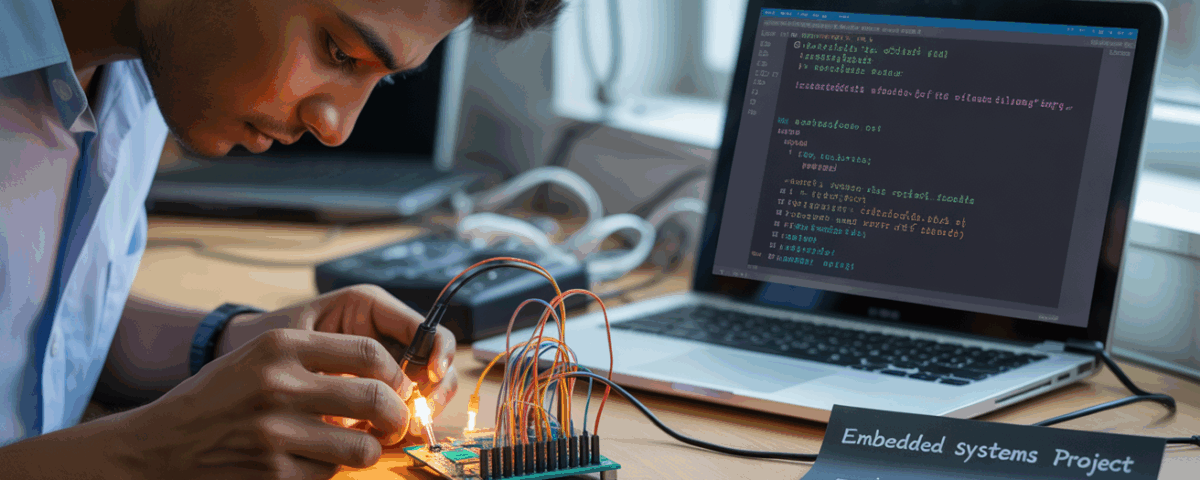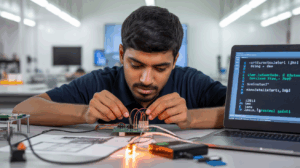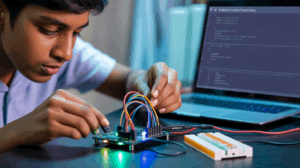
The Definitive Guide to MNC Companies in Madurai: Your Gateway to a Tech Career with Elysium Embedded School
September 23, 2025
The Automation Edge: Elevating Robotics for Students with Specialized Embedded Training.
November 15, 2025In the dynamic world of embedded systems, microcontrollers stand as the silent orchestrators behind a staggering array of modern electronics. From the simplest household gadgets to complex industrial machinery, these tiny processors are the driving force. While a variety of microcontroller families exist, the PIC has long been a favorite, celebrated for its architectural elegance, robust performance, and cost-efficiency. As the demand for skilled embedded and IoT engineers in India escalates, acquiring proficiency in this technology has become a career imperative. A comprehensive PIC Microcontroller Training Course provides the precise blend of theoretical knowledge and practical application required to thrive in this burgeoning sector.
Table of Contents
Understanding PIC Microcontrollers
PIC (Peripheral Interface Controller) microcontrollers are a family of powerful, single-chip microprocessors designed by Microchip Technology. These devices are renowned for their straightforward instruction set and highly efficient design, which makes them a top choice for a vast range of applications. Functioning as miniature, self-contained computing units, they are capable of executing a set of instructions to manage and control other electronic components with impressive precision. The logical architecture of a PIC is often what makes a PIC Microcontroller Training Course so accessible for new learners.
Key Families and Applications
The PIC ecosystem encompasses several key series, including the versatile PIC16 and PIC18, as well as the advanced dsPIC series, each engineered to address specific performance and complexity needs. Industries consistently choose PIC microcontrollers for their unwavering reliability and exceptional cost-effectiveness. Their versatility makes them the backbone of countless real-world solutions, from intuitive smart home appliances and cutting-edge automotive control systems to sophisticated robotics and robust industrial automation. A robust PIC Microcontroller Training Course introduces you to these diverse families and their real-world applications.
Why Enroll in a PIC Microcontroller Training Course?
Bridging Theory with Practice
A well-structured PIC Microcontroller Training Course serves as the vital link that transforms abstract academic concepts into tangible, deployable skills. While a theoretical understanding forms the groundwork, it is a dedicated training program that hones that knowledge into a truly valuable asset. Through immersive, hands-on labs and expertly guided projects, you will learn not just to code, but to diagnose and resolve real-world technical challenges, bringing your designs to life.
The Advantage of Structured Learning
While the path of self-learning is tempting, a formal PIC Microcontroller Training Course offers a strategic advantage. It provides a meticulously designed syllabus, personalized mentorship from industry veterans, and seamless access to professional-grade tools and hardware. This organized approach streamlines your learning, ensuring you build expertise methodically and without getting sidetracked. The added benefit of a certificate from a reputable training provider lends immediate and significant credibility to your professional profile.
PIC Microcontroller Training Course in India
A Thriving Hub for Embedded Skills
India is rapidly cementing its position as a global leader in embedded systems and IoT innovation. The demand for skilled engineers in the electronics, automotive, and smart device sectors is not just growing—it’s exploding. Consequently, pursuing a PIC Microcontroller Training Course in India is an exceptionally smart career move, positioning you squarely in the middle of a high-growth market.
Global Recognition and Affordability
By enrolling in a premier program within India, you gain access to world-class education that is both highly effective and economically accessible. The practical expertise you acquire from a high-quality PIC Microcontroller Training Course is universally applicable, equipping you to compete for roles not only in India but in technology markets worldwide. This combination of top-tier learning and affordability makes it an unbeatable proposition.
What You’ll Learn: A Comprehensive Syllabus
An effective PIC Microcontroller Training Course is built upon a meticulously crafted curriculum designed to ensure a holistic and practical learning journey.
Foundational Expertise
The program commences with the fundamentals, offering a deep dive into the world of embedded systems and clarifying the key architectural distinctions between microcontrollers and microprocessors. You will then systematically explore the unique architecture of PIC microcontrollers and gain mastery over their instruction set, which is the foundational language for all programming.
Programming and Interfacing
The core of the training focuses on practical coding and hardware interaction. You will gain proficiency in writing elegant and efficient code for PIC microcontrollers using Embedded C, the industry’s preferred language. The curriculum also places a strong emphasis on hands-on interfacing with vital peripherals such as GPIO, ADC, Timers, UART, SPI, and I2C, enabling your microcontroller to interact seamlessly with its physical environment.
Advanced Concepts and Projects
The final modules elevate your skills to an expert level. You will delve into sophisticated concepts like interrupt handling, a critical skill for developing real-time, highly responsive systems. Furthermore, you will gain hands-on expertise in circuit design using simulation tools like Proteus and MPLAB. The program culminates in a series of hands-on mini and major projects, transforming your accumulated knowledge into a robust, working system that forms the centerpiece of your professional portfolio.
A Roadmap to Expertise: A Deep Dive into a PIC Microcontroller Training Course Syllabus
Embarking on a career in embedded systems requires more than just theoretical knowledge; it demands a structured, hands-on learning journey. The syllabus of a comprehensive PIC Microcontroller Training Course serves as a precise roadmap, guiding learners from foundational concepts to advanced, real-world application. Each module is meticulously designed to build upon the last, ensuring a seamless and effective transition from a beginner to a confident, project-ready engineer. Here is a detailed look at the modules that constitute a top-tier PIC Microcontroller Training Course.
Module 1: Introduction to Embedded Systems & Microcontrollers
This foundational module serves as the essential entry point for anyone new to the field. It provides a holistic overview of what an embedded system is and how microcontrollers fit into the broader technological landscape. You will gain clarity on the fundamental differences between microcontrollers and microprocessors, understand the core components of a typical embedded system, and appreciate the significance of these devices in our modern world. This initial phase sets the stage for a successful journey through the entire PIC Microcontroller Training Course.
Module 2: PIC Architecture & Instruction Set
With the foundational knowledge in place, this module dives deep into the heart of the subject: the PIC microcontroller itself. Students will explore its unique and highly efficient architecture, gaining a thorough understanding of its memory organization, registers, and pin configurations. Crucially, you will master the PIC instruction set. This is the low-level language that allows you to directly command the microcontroller, a fundamental skill for writing optimized and efficient code. This part of the PIC Microcontroller Training Course is where the magic of hardware-level control begins.
Module 3: Programming PIC Microcontrollers using Embedded C
This is where your journey becomes hands-on. In this module, you will learn to program PIC microcontrollers using Embedded C, the industry-standard language for embedded systems. The curriculum focuses on writing clean, readable, and hardware-oriented code. You will learn key programming concepts essential for microcontrollers, such as memory management and bit-level manipulation, preparing you for the practical challenges of embedded software development. This core segment of the PIC Microcontroller Training Course is what truly builds your programming competence.
Module 4: Interfacing with Peripherals
A microcontroller’s power lies in its ability to interact with the outside world. This module focuses on making that connection a reality. You will gain practical expertise in interfacing with essential on-chip peripherals. The module covers GPIO (General Purpose Input/Output) for simple digital control, ADC (Analog-to-Digital Converter) for reading real-world sensor data, and Timers for time-based operations. You will also master critical serial communication protocols like UART, SPI, and I2C, which are vital for communication between the microcontroller and other devices.
Module 5: Sensor and Actuator Integration
This module takes your interfacing skills to the next level by combining them to build functional systems. You will learn to integrate a variety of sensors (inputs) to collect data from the physical environment and actuators (outputs) to create physical responses. For example, you will learn how to read data from a temperature sensor and use that data to control a cooling fan or an LED. This section of the PIC Microcontroller Training Course is all about creating a complete, reactive feedback loop in your projects.
Module 6: Interrupt Handling and Real-Time Applications
For truly responsive and efficient embedded systems, an understanding of interrupts is essential. This advanced module teaches you how to handle external events without continuously polling for them. You will learn to configure and use interrupts to create systems that can react instantaneously to triggers. This skill is critical for real-time applications found in industrial automation, robotics, and safety-critical devices, where a microsecond of delay can make a big difference. This module truly elevates your knowledge within the PIC Microcontroller Training Course.
Module 7: Circuit Design, Simulation Tools (Proteus, MPLAB)
Before you ever touch a physical component, you must first design and test your circuit. This module introduces you to professional simulation software like Proteus and the MPLAB X IDE. You will learn to design electronic circuits and simulate their behavior in a virtual environment. This process is invaluable for identifying and correcting design flaws early, saving time, money, and preventing costly hardware mistakes in the real world. This practical knowledge is a hallmark of a premier PIC Microcontroller Training Course.
Module 8: Debugging and Troubleshooting Skills
A crucial part of any engineering discipline is the ability to find and fix problems. This module focuses on teaching you a systematic approach to debugging. You will learn to use professional tools to identify both software bugs and hardware faults. This is not just about fixing code; it’s about understanding the entire system and its potential failure points. Mastering these troubleshooting skills will make you an invaluable asset in any technical team.
Module 9: Hands-on Mini and Major Projects
This is the culmination of everything you’ve learned. The PIC Microcontroller Training Course is built around practical application, and this module is where you prove your skills. You will undertake a series of mini-projects to reinforce concepts and then develop a major, portfolio-worthy project from scratch. This hands-on experience is what employers value most, as it demonstrates your ability to apply your knowledge to solve real-world problems.
Module 10: Certification Assessment and Project Portfolio Development
The final module is dedicated to solidifying your readiness for a professional career. You will undergo a comprehensive assessment to validate your skills and knowledge. More importantly, you will be guided in compiling a professional project portfolio. This portfolio, showcasing the projects you have built throughout the PIC Microcontroller Training Course, serves as a powerful testament to your abilities, providing concrete evidence of your expertise to potential employers.
PIC Microcontroller Training Course Online vs Classroom
The Flexibility of Online Learning
A PIC Microcontroller Training Course online provides unparalleled freedom. It allows you to set your own pace and learn from anywhere, making it an ideal choice for busy working professionals or students with demanding schedules. These platforms offer seamless access to virtual labs and recorded sessions, ensuring a comprehensive learning experience without any geographic constraints.
The Advantage of In-Person Learning
In contrast, a classroom-based PIC Microcontroller Training Course delivers a unique and immersive experience. It grants you direct access to state-of-the-art physical labs, fostering hands-on collaboration with peers and offering immediate, face-to-face guidance from expert instructors. This is particularly beneficial for those who thrive on direct interaction. Many premier institutions now offer a blended approach, which merges the convenience of online modules with the invaluable benefits of in-person lab sessions.
Best PIC Microcontroller Training Course: Features to Look For
To identify the best PIC Microcontroller Training Course, consider these essential hallmarks of a superior program:
A Curriculum that Mirrors Industry Needs
The program’s syllabus must be meticulously crafted to align with current industry standards and employer expectations. A forward-thinking curriculum will cover not just foundational concepts, but also advanced topics and modern tools that are in active use today.
The Power of Hands-On Learning
A strong emphasis on project-based learning is non-negotiable for true skill development. The course should provide ample opportunities for hands-on hardware exposure and practical application using industry-standard tools like MPLAB X and the PICkit debugger. This practical component is what sets a truly great PIC Microcontroller Training Course apart from the rest.
Comprehensive Career-Focused Support
Look for programs that offer more than just a certificate. Dedicated placement and internship assistance are crucial for translating your training into a job. Expert mentors with extensive real-world experience can provide invaluable insights and career guidance. The credibility of the certification is also paramount, as it serves as a key to unlocking professional opportunities.
Career Opportunities after Completing the Course
Diverse and In-Demand Job Roles
A PIC Microcontroller Training Course acts as a gateway to a variety of rewarding and in-demand careers. You can pursue roles such as an Embedded System Engineer, IoT Developer, Robotics Engineer, Firmware Developer, or PCB Designer. These specialists are crucial for companies operating at the intersection of hardware and software.
High-Growth Industries
The explosive growth of the IoT and smart devices markets ensures that a career in this field offers long-term stability and a high growth trajectory. Industries spanning automotive, consumer electronics, and industrial automation are constantly seeking professionals with microcontroller expertise, guaranteeing a steady stream of excellent job opportunities after completing a PIC Microcontroller Training Course.
Why Choose a PIC Microcontroller Training Course with Certificate?
The Credibility Factor
A PIC Microcontroller Training Course with Certificate is the ultimate proof of your technical competency. The certification adds significant professional value to your resume and LinkedIn profile, making you an immediately more attractive candidate to hiring managers. It acts as a recognized symbol of your skills and dedication.
Building a Strong Professional Profile
The certification acts as a crucial career gateway, not just within India but also in global markets. It instills immense confidence during interviews, as you can speak with authority about your skills and project experience, secure in the knowledge that your expertise has been formally validated. This is the difference between a self-taught enthusiast and a certified professional.
Why Elysium Embedded School?
Expert-Led Training and Cutting-Edge Labs
Elysium Embedded School is a recognized leader in embedded systems training in India, offering a specialized PIC Microcontroller Training Course with Certificate. The school is distinguished by its team of expert trainers who bring years of hands-on, real-world experience to the classroom. Students benefit from access to well-equipped labs, providing an ideal environment for hands-on, real-time project practice.
Flexible Learning and Career Support
The school offers flexible learning options, including online and offline modes, that cater to every learner’s needs and schedule. This ensures that a high-quality PIC Microcontroller Training Course is accessible to everyone. Moreover, the robust placement and career support services ensure that graduates are well-prepared and confident in securing their first job in the industry. The recognized certification from Elysium Embedded School further boosts your employability in the competitive market.
FAQs
- What is the duration of the PIC Microcontroller Training Course?
The program duration is flexible, typically ranging from 6 weeks to 3 months, depending on the chosen curriculum’s depth and project requirements.
- Do I need prior programming knowledge to join?
While a foundational understanding of C programming is beneficial, it is not a strict prerequisite. This PIC Microcontroller Training Course is structured to cover all fundamentals, making it perfectly accessible for beginners.
- Will I receive a certificate after completing the course?
Yes, upon the successful completion of the PIC Microcontroller Training Course, you will be awarded an industry-recognized certificate to validate your skills.
- Is the PIC Microcontroller Training Course available online?
Absolutely. Elysium Embedded School provides both online and offline learning options to accommodate different learning preferences and schedules.
- What kind of career support is offered after the course?
Elysium Embedded School offers comprehensive placement assistance, including tailored interview preparation and career counseling, to help graduates secure promising jobs in the embedded systems and IoT industries.
Conclusion
A Strategic Career Investment
The PIC Microcontroller Training Course is far more than a simple technical program; it is a strategic investment in your future. By gaining mastery over PIC microcontrollers, you unlock immense career opportunities in the fast-growing fields of IoT, robotics, consumer electronics, and industrial automation. A strong curriculum, hands-on projects, and a credible certification combine to create a solid foundation for any aspiring engineer.
Your Next Step to Success
At Elysium Embedded School, students gain access to a premier PIC Microcontroller Training Course in India, meticulously designed to meet industry standards while offering the ultimate flexibility. With a recognized certification, expert career guidance, and invaluable practical exposure, this program empowers you to thrive in the embedded systems and IoT-driven industries. Take the next step—transform your skills with a PIC Microcontroller Training Course at Elysium Embedded School and prepare for a future driven by innovation.













